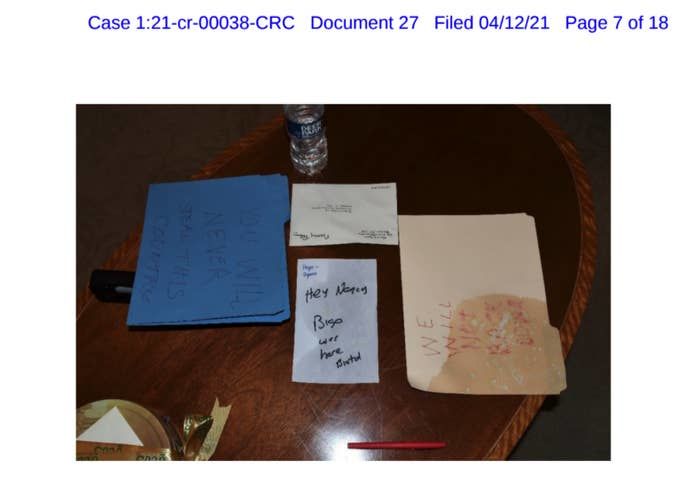
The Man Photographed With His Foot On Nancy Pelosi’s Desk During The Capitol Riots Will Be Released From Jail
Richard Barnett, an Arkansas man photographed with his foot on House Speaker Nancy Pelosi’s desk during the Capitol insurrection, will be allowed to go home as his case goes forward, a judge ruled Tuesday, reversing a January order that had kept him behind bars.
Barnett is one of the most high-profile defendants charged in connection with the Jan. 6 riots to date. The photos of him smiling as he sat in Pelosi’s office went viral, as did a video of him outside the Capitol in which he told a reporter that he’d left a note that read, “Nancy, Bigo was here, you bitch.” At a hearing in late January, a federal judge in Washington, DC, ordered Barnett to remain in jail, concluding that his “entitled behavior ... shows a total disregard for the law and for officials' directives.”
But the legal landscape surrounding the Capitol riot cases has changed in the last three months, and Barnett made another attempt at getting out of jail. This time, citing recent developments in the hundreds of prosecutions filed since his arrest on Jan. 8 and appearing before a different judge, he succeeded. US District Judge Christopher Cooper concluded that prosecutors had failed to show that Barnett posed a specific future threat to public safety that couldn’t be addressed by restrictive release conditions.
Throughout the hearing, Cooper expressed skepticism about arguments Barnett’s lawyer made challenging the strength of the government’s evidence. Cooper said that information presented by prosecutors about Barnett’s apparent connection to the QAnon mass delusion and involvement in QAnon-affiliated demonstrations in which he was armed was “concerning.” But a March opinion from the US Court of Appeals for the DC Circuit, which set the bar higher for pretrial detention for Jan. 6 defendants who aren’t charged with specific acts of violence, ultimately worked in Barnett’s favor, Cooper said; he announced his decision shortly after hearing arguments.
 The note Barnett is alleged to have left on Pelosi's desk on Jan. 6.
The note Barnett is alleged to have left on Pelosi's desk on Jan. 6.
“The notion that the events of January 6 were a legitimate or excusable social protest against ruling elites or, worse yet, a reaction to some people in society feeling that they have been unfairly scapegoated for racism is, in a word, absurd,” Cooper said.
Barnett will be released to home detention and prohibited from having any weapons in his home — including stun guns, Cooper noted. The judge warned Barnett that the decision to allow him to go home wasn’t a sign that he’d be lenient if he later pleaded guilty or went to trial and was convicted. Cooper said he’d look at Barnett’s compliance with his release conditions in crafting any sentence. ”Consider this a test, okay?” he said. Barnett, who was appearing remotely from jail for the virtual hearing and had been silent while his lawyer argued, thanked the judge.
It’s the latest setback for the US attorney’s office in Washington since the DC Circuit’s ruling in Munchel and Eisenhart’s case. Prosecutors in some cases have dropped efforts to keep defendants behind bars in the weeks since the appeals court released the opinion, and judges in some cases — but not all — have handed the government losses when prosecutors pressed ahead with seeking detention.
Pretrial detention isn’t supposed to be punishment for a crime that a defendant hasn’t been convicted of yet; judges are only supposed to keep someone in jail if they meet certain criteria, including if they pose a flight risk or danger to the public or risk obstructing the case. Cooper noted that the DC Circuit held in Munchel’s case that participation in the insurrection on its own wasn’t enough to justify detention and that the government hadn’t shown Barnett posed a “concrete danger” any more than others who also believed in QAnon and had access to firearms.
Assistant US Attorney Mary Dohrmann told Cooper that she hadn’t formally extended a plea offer to Barnett but had been in early talks with his lawyer about that possibility. A federal grand jury returned a seven-count indictment against Barnett in late January; Dohrmann said on Tuesday that his estimated sentencing guidelines range for those charges is between 70 and 87 months in prison, although that could change if he ended up pleading guilty and cooperating. The first plea agreement in the Capitol riot cases was revealed earlier this month.
A spokesperson for the US attorney’s office declined to comment. Barnett’s lawyer did not immediately respond to a request for comment after the hearing.











